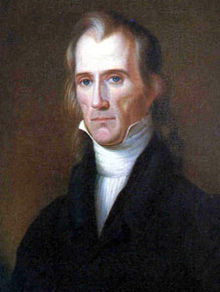Hugh Lawson White
| Hugh Lawson White | |
|---|---|

Portrait by Ralph E.W. Earl
|
|
|
United States Senator from Tennessee |
|
|
In office October 28, 1825 – January 13, 1840 |
|
| Preceded by | Andrew Jackson |
| Succeeded by | Alexander O. Anderson |
| President pro tempore of the United States Senate | |
|
In office December 3, 1832 – December 15, 1833 |
|
| Preceded by | Littleton Tazewell |
| Succeeded by | George Poindexter |
| Member of the Tennessee Senate | |
|
In office 1815–1817 |
|
| Personal details | |
| Born |
October 30, 1773 Province of North Carolina, British America (modern Iredell County, North Carolina) |
| Died | April 10, 1840 (aged 66) Knoxville, Tennessee, U.S. |
| Resting place |
First Presbyterian Church Cemetery Knoxville, Tennessee, USA |
| Political party | Democratic-Republican, Democratic, Whig (1836–1840) |
| Spouse(s) | Elizabeth Carrick (1798–1831, her death) Anne Peyton (1832–1840, his death) |
| Relations |
James White (father) Samuel Carrick (father-in-law) Charles McClung (brother-in-law) John Overton (brother-in-law) John Williams (brother-in-law) |
| Profession | Politician, lawyer, judge, banker |
| Religion | Presbyterianism |
Hugh Lawson White (October 30, 1773 – April 10, 1840) was a prominent American politician during the first third of the 19th century. He succeeded Andrew Jackson and served in the United States Senate, representing Tennessee, from 1825 until his resignation in 1840, and was a Whig candidate for President in 1836. He also served as a state supreme court justice, and president of the Knoxville branch of the Bank of Tennessee.
An ardent strict constructionist and lifelong states' rights advocate, White was one of President Jackson's most trusted allies in Congress in the late 1820s and early 1830s. White fought against the national bank, tariffs, and the use of federal funds for internal improvements, and led efforts in the Senate to pass the Indian Removal Act of 1830. In 1833, at the height of the Nullification Crisis, White, as the Senate's president pro tempore, coordinated negotiations over the Tariff of 1833.
Suspicious of the growing power of the presidency, White began to distance himself from Jackson in the mid-1830s, and realigned himself with Henry Clay and the burgeoning Whig Party. He was eventually forced out of the Senate when Jackson's allies, led by James K. Polk, gained control of the Tennessee state legislature and demanded his resignation.
White was born in what is now Iredell County, North Carolina (but then part of Rowan County), the eldest son of James White and Mary Lawson White. James, a Revolutionary War veteran, moved his family to the Tennessee frontier in the 1780s, and played an active role in the failed State of Franklin. In 1786, he constructed White's Fort, which would eventually develop into Knoxville, Tennessee. Young Hugh was a sentinel at the fort, and helped manage its small gristmill.
...
Wikipedia
